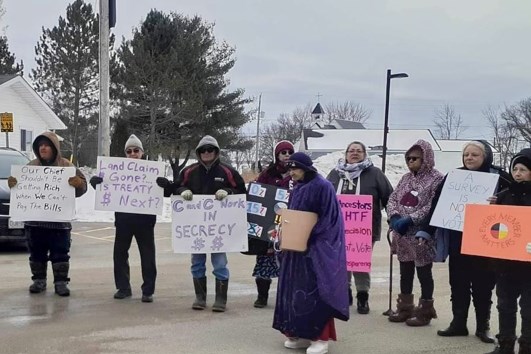Settlement funds are coming to Nipissing First Nation, most likely this summer, and members want to ensure the money is distributed fairly.
This past Friday, about 60 people showed up to protest by the Band Office in Nipissing First Nation to voice their concerns about the distribution of settlement funds from the Robinson Huron Treaty. Jan Couchie helped to organize that rally and made the drive from Virginia to voice her concern. She moved south a few years ago but lived much of her life in Nipissing First Nation.
“There’s a lot of issues regarding this treaty settlement,” Couchie told BayToday. “The main issue is the First Nation signed this settlement without the membership having a referendum on it or even knowing anything about it.”
Scott McLeod, the Chief of Nipissing First Nation noted that “the crux of the demonstration” is a result of "not fully understanding the spirit, the intent, and the legal wording of the treaty that was upheld in court.”
See: Robinson Huron Nations sign Treaty settlement agreement
This past January, the Federal and Provincial government, along with 21 First Nations, settled a 10-year court case concerning an annuity settlement as per the Robinson Huron Treaty. Established in 1850, part of this treaty guaranteed an annual payment to each member of the First Nation who signed the treaty.
The money paid the way for the government to draw resources from First Nation lands. The annual payment was around $4, and to someone in the 1850s, that would be equivalent to having $158 today. Since then, the payment has remained the same, and each signatory First Nation member still receives their $4 dollars per year.
Throughout the many decades since the treaty was signed, that annual annuity was supposed to rise, particularly in accordance with the amount of wealth the province earned from resources within traditional lands.
Now that the suit is settled, the province and the feds are each paying $5 billion to those 21 First Nations for retribution.
See: Canada, Ontario sign Robinson Huron Treaty settlement
At issue, Couchie said, was how this money will be distributed. Some members, she noted, want the funds to be paid directly to members, whereas Nipissing First Nation’s council plans to hold a percentage of the settlement in a community fund – what it calls a legacy fund.
Chief McLeod noted that since Nipissing First Nation members have directly received the $4 annual payment for well over a century, “they feel that the compensation is 100 per cent theirs, and somehow we are taking money from them,” for the proposed community fund. “When in fact,” he continued, “if they understood the treaty, how it was written, what our legal arguments were, and how that decision was upheld in court, they would understand that the treaty itself was not merely an individual payment.”
“Rather,” Chief McLeod explained, “it was a communal payment to a Nation that first started in 1850 as a lump sum to the Chiefs.” This payment “took care of the communal needs at that time,” he continued, “the rest was dispersed to the individual, which became the $4” payment.
This was how the original payment structure worked for Nipissing First Nation, Chief McLeod emphasized. However, “shortly after” the Crown implemented the treaty, the government “decided this was too costly and they were going to administer payments instead of giving it to the Chiefs” and allowing them to administer the funds.
Nipissing First Nation council plans on distributing up to 75 per cent of the money it receives directly to band members. The remaining money will remain within a legacy fund, “money set aside for generations to come.”
“Unfortunately,” Chief McLeod continued, “some people don’t understand” fully the nuances of the treaty “and therefore have taken the position that this money belongs to them.” The treaty, he emphasized, was “signed on behalf of the Nation,” not individual members.
How much money is on the table? Couchie estimated over $500 million dollars, but Chief McLeod remains unsure as to the exact number. Mostly because the government hasn’t provided a number to him yet.
Each of the 21 First Nations is submitting a list of band members to the government, Chief McLeod explained, which will then decide how much will be provided to each Nation. “Until that is figured out,” Chief McLeod continued, “we cannot give an accurate number.”
This lack of information caused Couchie concern, as without accurate numbers, addressing the issue productively proved difficult.
The issue will return to council in late March, when a vote is expected to take place, asking band members if they would prefer to set aside 25 or 35 per cent of the settlement for the community fund. Couchie, and others, would prefer to see more options, including the option to set none aside, or smaller percentages, such as 5, 10, or 15 per cent of the settlement.
This would provide a more “nuanced and flexible approach that takes into account the diverse economic circumstances and aspirations of all the community members,” Couchie said.
However, the chief and council are most likely sticking to the original percentages for the vote and keeping those funds for the community’s future. The settlement “is not only good for the community,” Chief McLeod said, “it’s good for the region. The benefit is not just within the boundaries of the First Nation.”
David Briggs is a Local Journalism Initiative reporter who works out of BayToday, a publication of Village Media. The Local Journalism Initiative is funded by the Government of Canada.
